Iowa women who saved industry
The Rosie Riveters of Iowa stories at Mulberry Center Saturday

Submitted photo: Women are shown working at the John Deere plant in Waterloo in 1943.
The stories of the women from Iowa who were truly living the life of “Rosie the Riveter” during the 1940s will be presented on Saturday afternoon at the Wilson Brewer Park.
“Rosie the Riveters of Iowa” will be presented by author Linda Betsinger McCann from Shell Rock. The presentation will begin at 1 p.m. at the Mulberry Center Church.
Shortly after the COVID-19 pandemic began, McCann started researching and talking with women who worked in the factories during World War II. She was able to interview 35 different women who were the Rosie Riveters in their day.
“I started working on this book three years ago, so all the women were in their 80s and 90s,” she said.
So she was surprised during a presentation in southeast Iowa, when six women who worked in those factories walked in.
“I had an idea that most of the Iowa women traveled west,” she explained “There are no real numbers, but they estimate that 19 million women worked nationwide in the factories alone.”
But they didn’t have to go far to find a need in the factories.
“I was completely shocked how many (Iowa) factories we had with military contracts during World War II,” said McCann. “There were 70 different factories with military contracts.”
Women working in factories today is common, however, things were different then.
The year was 1942.
Prior to the 1940s, there were few jobs for women that required mechanical or physical skills. The most common professions were as teachers, secretaries, bookkeepers, saleswomen or cooks.
It was the beginning of an era when women were needed to carry on men’s work in the industries, the fields, the businesses. The song “Rosie the Riveter” by Redd Evans and John Jacob Loeb was heard on radios all across the country.
“Rosie the Riveter” was an iconic poster featuring an image of a female factory worker with her hair wrapped up in a red polka-dot scarf, rolling up her sleeve and flexing her bicep muscle, exhorting other women to join the World War II effort with the declaration that “We Can Do It!”
The manufacturing company, Westinghouse, decided to commission artist J. Howard Miller to make a series of these posters to promote the war effort. Miller never intended his creation to be a symbol of female empowerment. He meant it as an encouragement for women to apply for jobs in factories as part of their patriotic duty to the war effort.
While the poster image is based on real women, “Rosie the Riveter” is a composite character created to represent all the women employees during World War II.
This became one of the most successful recruitment tools in American history and the most iconic image of working women in the World War II era.
As millions of men left for military service, women filled critical roles in factories, shipyards, and beyond — riveting, welding, and assembling the tools of war. “Rosie the Riveter” also helped break down traditional gender barriers and proved that women could excel in skilled technical jobs.
But the factories were not prepared for the women in the workplace.
“When a group of Iowa from southeast Iowa went to work on the very first day, there were no women’s restrooms in the factory,” she learned, “And there was no such thing as (Human Resources) in those days.”
The program on Saturday is free to the public, but accepts donations to cover costs of building upkeep and program costs. McCann’s book was published in 2023 by Tandem Publishing of Des Moines. She will have books on hand for those who want to read the full story of the Iowa Rosies.
The doors will be open at 12:30 p.m. and the program will begin at 1 p.m. Saturday.



